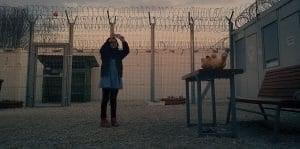
When the Taliban puts a bounty on Afghan director Hassan Fazili’s head, he is forced to flee with his wife and two young daughters. Capturing their uncertain journey, Fazili shows firsthand the dangers facing refugees seeking asylum and the love shared between a family on the run.
Every once in a while, a searing cinematic achievement comes by that may just represent the flap of a butterfly’s wing which leads to a global paradigm shift. Midnight Traveler is such a film. With the current refugee crisis rapidly getting more extreme, Hassan Fazili’s documentary couldn’t be more timely, not just reminding but immersing us into the hell that the majority of us witnesses fleetingly on the news, from afar. Fazili captures all the heartache and terror of seeking asylum in an increasingly hostile world.
Filmmakers and café owners, Hassan and his wife Fatima – along with their young daughters Nargis and Zahra – have to flee Afghanistan after the Taliban put out a call for Hassan’s death. They seek refuge in Tajikistan, but after “14 months of asylum applications, no one has agreed to help the family to safety.” Failing to find any semblance of peace back at home, they decide to seek safety in Europe, by way of Iran and Turkey – a grueling, 3,500-mile journey. “Wherever we can go, that’s where we’re going,” Fatima states flatly.
“…Hassan and his wife Fatima – along with their young daughters – have to flee Afghanistan after the Taliban put out a call for Hassan’s death.”
“Grueling” barely does justice to their ordeals. They ride in a dilapidated, crowded minivan. They stay in the tiniest of apartments in Istanbul. They climb over dangerous mountains into Bulgaria, where they find temporary solace in a safe house – emphasis on “temporary,” considering the daughters are soon threatened with kidnapping. They sleep outside in a freezing cold forest, then in an abandoned building, and eventually a miserable camp. After almost 600 days of travel, the Fazilis finally end up in Hungary, where they wait for their case to be heard. Hassan resolutely films it all, at one point plunging into the midst of a violent Nationalist Party revolt.
Their home country crumbles, the Taliban is after them, and they have nowhere to stay, yet the Fazilis maintain a sense of humor. “You can tell by his face that he’s Taliban-ier than Taliban,” Fatima states at one point. She later disastrously attempts to learn how to ride a bike. Nargis is a constant source of comic relief, both innocent and surprisingly mature. “This is a story of a journey to the edge of hell,” she says early on; yet both her and Zahra are so happy with the tiniest of conveniences. Tiny moments of joy resonate amidst the terror, such as Nargis in awe of the ocean, or playing with a fan, or building a snowman, or stealing plums, or just dancing – notably – to Michael Jackson’s “They Don’t Care About Us.”
While those scenes of humor are welcome, it’s the family’s prevailing, palpable, unbreakable bond and kindness that buoy the film. No matter how dire the circumstances become – such as an abhorrent police officer treating them like trash for no apparent reason – they persevere, their gentle souls able to withstand torment. “They’re living beings,” Hassan says, referring to… ants. “They deserve a right to live and breathe.” His tragic story of a best friend, Hussain Hashemi, enlisted by the Taliban, is bound to send that lump rolling up your throat. Hassan’s piercing soliloquy on his obsession with cinema and the fragile barrier between art and exploitation similarly resonates.
“Shooting on iPhones these days is a nifty gimmick if done right…but in Midnight Traveler it’s no gimmick – it’s Hassan’s only choice.”
Shooting on iPhones these days is a nifty gimmick if done right – see Steven Soderbergh’s Unsane or Sean Baker’s Tangerine – but in Midnight Traveler it’s no gimmick – it’s Hassan’s only choice. Luckily, this eliminates any traces of gloss or bias, the filmmaker capturing every grimy detail – but also some desolate, stunning shots of barren, peach sunsets and mosques that seem to signify death.
Yes, Fazili’s documentary may contain stylistic flourishes – ominous music, somber voiceover narration, prolonged montages and shots of static – which are unnecessary, considering the inherently compelling nature of its story. It’s a minor flaw in an otherwise-stellar film, which by turns punches you in the gut and gives you the warmest of embraces. A call to action, a sobering first-hand look at the grueling ordeals refugees face, a story of love persevering against all odds, and a visceral, real-life thriller, Midnight Traveler is a unique cinematic experience that will hopefully snap us all to reality.

Midnight Traveler (2019) Directed by Hassan Fazili. Starring Hassan Fazili, Nargis Fazili, Zahra Fazili, Fatima Hossaini. Midnight Traveler screened at the 2019 San Francisco Film Festival and the 2019 Newport Beach Film Festival.
9 out of 10

I just saw this film on our local Public Broadcast tv channel. It is a gut punch to your consciousness. What this family endures is unbelievable. I’m dying to know how they are doing now. How does one get an update on their situation?
Wow, what a wonderful review! And such an important movie. When can I see this in Germany?